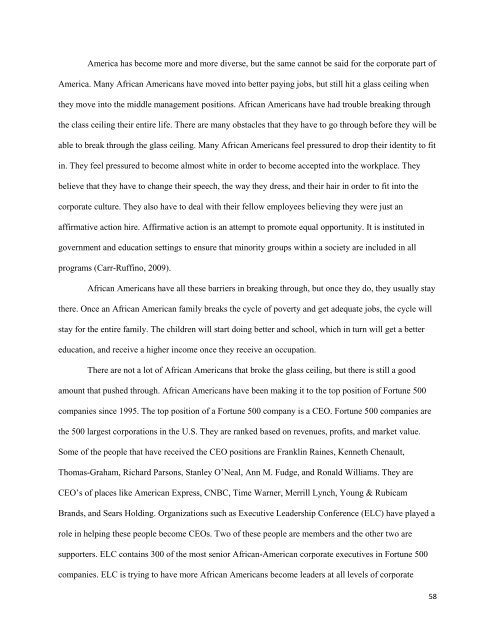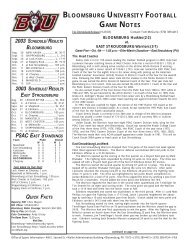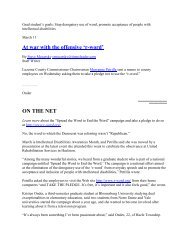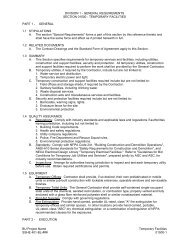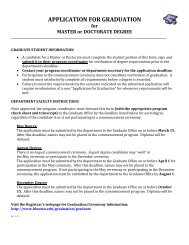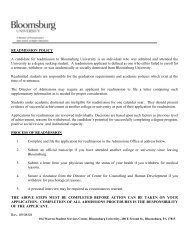Human Rights at Home and Abroad: Past, Present, and Future
Human Rights at Home and Abroad: Past, Present, and Future
Human Rights at Home and Abroad: Past, Present, and Future
You also want an ePaper? Increase the reach of your titles
YUMPU automatically turns print PDFs into web optimized ePapers that Google loves.
America has become more <strong>and</strong> more diverse, but the same cannot be said for the corpor<strong>at</strong>e part of<br />
America. Many African Americans have moved into better paying jobs, but still hit a glass ceiling when<br />
they move into the middle management positions. African Americans have had trouble breaking through<br />
the class ceiling their entire life. There are many obstacles th<strong>at</strong> they have to go through before they will be<br />
able to break through the glass ceiling. Many African Americans feel pressured to drop their identity to fit<br />
in. They feel pressured to become almost white in order to become accepted into the workplace. They<br />
believe th<strong>at</strong> they have to change their speech, the way they dress, <strong>and</strong> their hair in order to fit into the<br />
corpor<strong>at</strong>e culture. They also have to deal with their fellow employees believing they were just an<br />
affirm<strong>at</strong>ive action hire. Affirm<strong>at</strong>ive action is an <strong>at</strong>tempt to promote equal opportunity. It is instituted in<br />
government <strong>and</strong> educ<strong>at</strong>ion settings to ensure th<strong>at</strong> minority groups within a society are included in all<br />
programs (Carr-Ruffino, 2009).<br />
African Americans have all these barriers in breaking through, but once they do, they usually stay<br />
there. Once an African American family breaks the cycle of poverty <strong>and</strong> get adequ<strong>at</strong>e jobs, the cycle will<br />
stay for the entire family. The children will start doing better <strong>and</strong> school, which in turn will get a better<br />
educ<strong>at</strong>ion, <strong>and</strong> receive a higher income once they receive an occup<strong>at</strong>ion.<br />
There are not a lot of African Americans th<strong>at</strong> broke the glass ceiling, but there is still a good<br />
amount th<strong>at</strong> pushed through. African Americans have been making it to the top position of Fortune 500<br />
companies since 1995. The top position of a Fortune 500 company is a CEO. Fortune 500 companies are<br />
the 500 largest corpor<strong>at</strong>ions in the U.S. They are ranked based on revenues, profits, <strong>and</strong> market value.<br />
Some of the people th<strong>at</strong> have received the CEO positions are Franklin Raines, Kenneth Chenault,<br />
Thomas-Graham, Richard Parsons, Stanley O‘Neal, Ann M. Fudge, <strong>and</strong> Ronald Williams. They are<br />
CEO‘s of places like American Express, CNBC, Time Warner, Merrill Lynch, Young & Rubicam<br />
Br<strong>and</strong>s, <strong>and</strong> Sears Holding. Organiz<strong>at</strong>ions such as Executive Leadership Conference (ELC) have played a<br />
role in helping these people become CEOs. Two of these people are members <strong>and</strong> the other two are<br />
supporters. ELC contains 300 of the most senior African-American corpor<strong>at</strong>e executives in Fortune 500<br />
companies. ELC is trying to have more African Americans become leaders <strong>at</strong> all levels of corpor<strong>at</strong>e<br />
58


